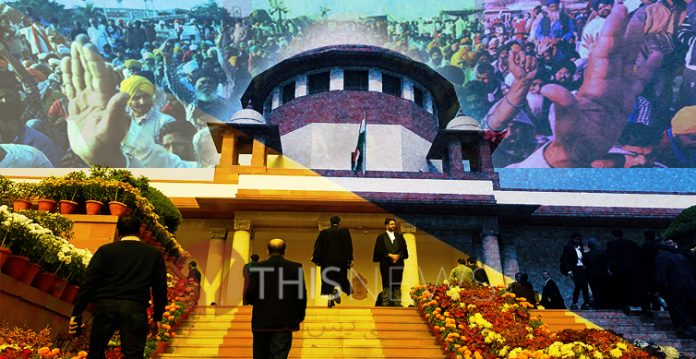In a bid to put an end to the woes of the farmers and the ongoing protests at the national capital, the Supreme Court of India today placed a temporary pause on the 3 farm laws that had robbed farmers of their peaceful sleep.
The top court, in its order, stated that the laws implemented in September will not be in the picture, for the time being, giving a massive disappointment to the Centre that was adamant on not withdrawing the contentious laws come anything. To discuss the matter further, the apex court said that a committee will be formed consisting of agricultural experts who can create a series of negotiations with the protesting farmers, favorable for both parties.
Terming it as a “victory of fair play”, Chief Justice SA Bobde said, “We are staying three farm laws until further orders.”
“While we may not stifle a peaceful protest, we think that this extraordinary order of stay of implementation of the farm laws will be perceived as an achievement of the purpose of such protest at least for the present and will encourage the farmers’ bodies to convince their members to get back to their livelihood, both in order to protect their own lives and health and in order to protect the lives and properties of others,” he added while announcing the order on the matter that had remained on the top of the bulletin boards since September last year.
Defending its move, the government told the court that the laws “were not hurriedly made” as they were reached upon after 2 decades of discussions.
No settlement of the matter was seen even after the 8th round of talks between the Centre and farmers as the former remained firm on its stance of not repealing the laws but rather amending them, an offer rejected by the latter.
As there was “no solution in sight”, the top court retaliated and said that it would ensure it takes steps to try and resolve the issue as it had the power needed to suspend the 3 laws.
“These are matters of life and death. We are concerned with laws. We are concerned with the lives and property of people affected by the agitation. We are trying to solve the problem in the best way. One of the powers we have is to suspend the legislation,” the Chief Justice said.
“We want to solve the problem and that’s why we are making the committee,” he further said.
Apart from this, the apex court also gave its suggestions for the formation of the committee that will make the negotiations. It included the names of agricultural economist Ashok Gulati, Bhupinder Singh Mann (Ex-Rajya Sabha member), Pramod Joshi (International Food Policy Research Institute), and Anil Ghanwat (Shetkari Sanghatana).
Notably, all 4 people mentioned by the SC are pro-farm laws.
Opposed to widespread rumors, former Chief Justice of India RM Lodha, said he has declined the offer to head the panel of members for the committee.
Moreover, the Supreme Court also sent a notice to the farmers following a petition submitted by the Delhi Police for removing the tractor rally that remained a part of the agenda of the farmers for the Republic Day Parade on January 26th.
ML Sharma, the lawyer representing the farmers, was thrashed by the panel of judges after he said that his clients will not be a part of the committee due to the PM’s disinterest in talking to them. To this, the CJ said, “We cannot ask the PM anything, he is not a party before us.”
“This is not politics. There is a difference between politics and judiciary and you will have to cooperate,” he added.
The top court, yesterday, had expressed its dismay over the government’s method of dealing with the urgent matter, saying it was “extremely disappointed”.
Directing sharp remarks at the central government, it said, “Each one of us we will be responsible if anything goes wrong. We don’t want any injuries or blood on our hands. Who is going to be responsible for bloodshed if any.”
As the debate was regarding the MSP as well, the SC in its stay order of today said, “The Minimum Support Price System in existence before the enactment of the Farm Laws shall be maintained until further orders. In addition, the farmers’ landholdings shall be protected, i.e., no farmer shall be dispossessed or deprived of his title as a result of any action taken under the Farm Laws.”


